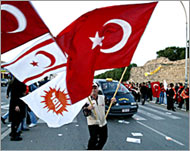Pro-EU Turkish Cypriots claim victory
The pro-settlement Turkish Cypriot prime minister, Mehmet Ali Talat, has claimed victory in Sunday’s general elections in the breakaway state in northern Cyprus.

However, Talat acknowledged he may not have enough parliamentary seats to come to power on his own.
The parliamentary elections in the self-declared Turkish Republic of Northern Cyprus may be critical for the future of the long troubled island, but among Turkish Cypriots themselves opinion was deeply divided.
With four parties likely to win seats, it seemed none of them would have a sufficient majority to form a government on its own. The concern is that this may mean another unhappy coalition between those in favour of the existing UN plan for reunification and those against.
The election was necessitated by the the collapse of the previous coalition over this very issue.
Last April, the UN peace plan was put to a referendum. Back then, Turkish Cypriots voted overwhelmingly to approve the plan while Greek Cypriots voted overwhelmingly against it.
Political reward
The European Union and the US, both of which backed the UN plan, promised that they would reward the Turkish Cypriots for their “yes” vote.
However, “many people who supported the UN plan and voted for it back then are disappointed now”, businessman Ismail Sayi, from the island’s divided capital Nicosia, said.
“They expected much more support from the EU and US. We knew there could be no ‘magic wand’, but people’s expectations were of a very rapid change.”
 |
|
The Republican Turkish Party is a |
Many complain that this has not happened – a factor that may undermine support for those parties in favour of reunification, while bolstering support for those against.
“The elections are therefore clearly critical,” Ayse Ertani of Kyrenia said. “Obviously, the whole peace process needs a Turkish Cypriot government committed to reunification. A government of another hue would be a setback.”
Currently, the largest party at the last elections, the Republican Turkish Party (CTP) of Prime Minister Talat, and the small Communal Liberation Party (TKP) of Mustafa Akinci are clear supporters of reunification on the basis of the UN plan.
On the other hand, the National Unity Party (UBP) of former prime minister Dervis Eroglu and the Democrat Party of Serdar Denktas are generally against.
Empty promises?
UBP supporter Ayse Ertin of Girne believes the referendum showed that there was no point in trusting the EU. He said, “They made all these promises about ending our isolation and helping the economy – but nothing has really happened and the Greek Cypriots have meanwhile joined the EU and can make sure nothing ever will happen.”
Waiter Hasan Kesici from Girne was also unimpressed by the EU’s performance. “There is a Turkish saying that the only person a Turk can trust is another Turk,” he told Aljazeera.net.
 |
|
EU’s performance has failed to |
Yet EU Ambassador to Cyprus Adriaan Van Der Meer says such an assessment is unfair.
“We have implemented a variety of policies since the referendum,” he told Aljazeera.net. “Now there is free movement of EU citizens across the Green Line – the line dividing the island – and people can move goods across too.
“At the same time, there are a number of projects under way, including a six million euro restoration project in Nicosia, Kyrenia and Famagusta; help for small- and medium-sized businesses in adjusting to EU laws; and technical assistance.
“Besides, financial assistance to the Turkish Cypriots of 259 million euros is nearly agreed, while debate on the idea of direct trade between the EU and the Turkish Cypriots is advanced.”
Economic problem
Last week saw a delegation from the US-Turkish business council visit Turkish Cyprus, to be greeted by the US ambassador.
However, restaurateur Hasan Turan, who lives on the edge of one EU-backed restoration project in Nicosia, Samanbahce, remains unimpressed.
 |
|
Years of sanctions have taken |
He said, “We need 1000 Samanbahces, not just one. There are major economic problems here. In fact, the whole problem is economic.”
Turkish Cyprus has for years been under an economic embargo, which has hit its principle industries – tourism and citrus products – badly. Many expected this embargo to be lifted after the referendum.
The election may also have an impact on the EU hopes of the Turkish Cypriots” big brother, Turkey.
“Clearly, if the Cyprus problem continues unsolved, this is going to complicate matters considerably for Turkey’s accession,” one EU insider told Aljazeera.net.
Old positions
Yet CTP campaign chiefs remain hopeful. “For most of the last 40 years, the world has seen the Turkish Cypriots as the main obstacle to a settlement on the island,” CTP staffer Hasan Sarici said.
“But after the referendum last April, people saw that it now it is the Greek Cypriots. There is some disappointment, but the people will not allow a return to the old positions.”
Meanwhile, Sayi remains more troubled.
“The Turkish Cypriots want to solve the Cyprus problem on the basis of political equality [with the Greek Cypriots],” he says. “But we are now alone on this. If the world doesn”t support the Turkish Cypriot people, it will be very difficult for us to get a sustainable peace.”